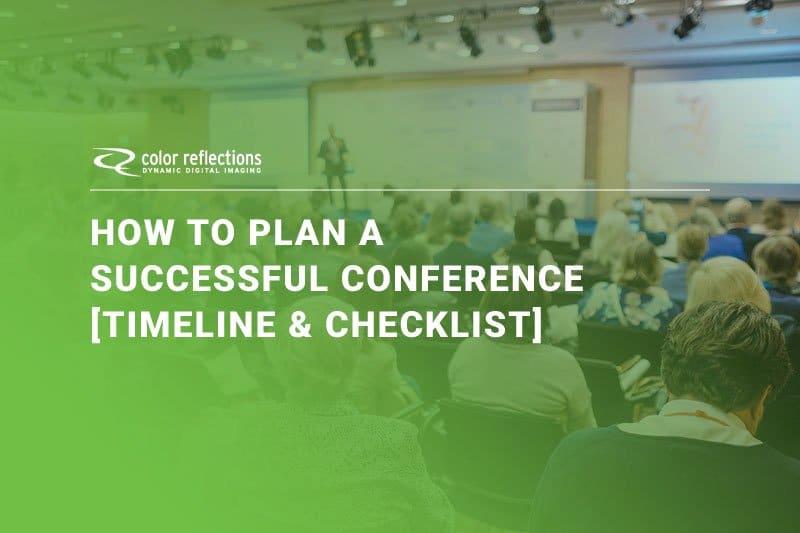There are many factors to consider when you’re organizing a conference. All the different tasks you need to take care of can be overwhelming, so it’s a good idea to break them down into small steps so that you’re not trying to accomplish everything all at once at the last minute. With careful preparation, you can plan a successful conference that will resonate with attendees.
Want to make your next conference a success?
Grand format printing from Color Reflections can grab the attention of your attendees.
How Do You Plan a Successful Conference?
There are several things you’ll need to make a conference successful. These include:
- Organization: Being organized makes all the difference in conference planning. You should plan out each detail of what you’ll need to have completed before, during, and after the conference. It’s also a good idea to have a backup plan for each phase.
- Venue: The venue you select will be a key consideration. Participants will appreciate a convenient location with comfortable rooms and free Wi-Fi. You should have knowledge of the transportation options to hotels from the venue for out-of-towners.
- Staff: Most successful conferences have a good assortment of friendly staff members to answer questions and direct participants to where they need to be.
- Advertising: A good marketing strategy is essential to ensure the best outcome for your event. You should create interest months before the formal announcement through a conference teaser. All materials should complement your brand so that people will be able to identify your company regardless of the medium you use to advertise.
- Participants: Consider who will be coming to your conference. To pull off a successful event, you will need not only the guests but also presenters, exhibitors, support staff and venue staff.
- Speaker system: All good conferences have a top-notch speaker system. Visit the location and test out the speakers to ensure each visitor will be able to tune in. You should also have tech support on hand should the speakers fail to work properly on conference day.
- Event program: You’ll want to create a program that informs readers of what they can expect from the conference. It should be aesthetically pleasing, preferably printed in your brand’s color scheme. Make it easy to read and available for download ahead of time.
How Do You Write a Timeline for an Event?
When it’s time to sit down and start planning your conference, you’ll need to consider the following:
- What are you goals for this conference?
- What is your ultimate budget? What format or theme do you want to use?
- What are your top choices for the venue?
- Who will you be inviting to the event? Which vendors do you want to work with?
- When would you like to hold the conference?
- Who do you want to speak?
- How do you want to promote the event?
- How will you follow up with participants?
Here is an example timeline you can use to begin brainstorming.
How to Plan a Conference [Timeline]
You should begin planning your conference at least 6 months in advance.
6 Months Away
- Roles: Consider which tasks your team will be handling. Who will you invite to speak, and who do you plan to invite as guests?
- Budget: Decide what your overall budget is and how much you plan to spend on each aspect of the event, from the marketing to the catering.
- Goals: What are your primary objectives? Create a list of what you hope to achieve.
- Venue: Venues book up fast, so you should reserve your ideal location as soon as possible.
- Vendors: Vendors you might need include catering, security services, and tech support. Scheduling with them well in advance will secure your dates.
- Marketing: Create your marketing plan. Use social media to get the word out about your event. Ordering large-format graphics can help your event in a big way. Consider options such as banners to hang near the venue to inform people about the conference.
3 Months Away
- Vendors: Confirm the date with each of your vendors. If you’ve previously made a deposit, now is a good time to make the full payment.
- Supplies: To avoid rush costs, you should order your supplies well before the event. You might need badge holders as well as swag like lanyards, pens, and T-shirts. Large-format signs can also help direct attention to the conference.
- Speakers: Confirm that your speakers will be able to attend. If anyone drops out, you should have a backup speaker ready.
1 Month Away
- Catering: Confirm your catering order. Make sure you have enough food to cover all guests as well as any surprise visitors.
- Schedule: Create a schedule for the day of the event. You should print this on a program to hand out to your guests so that attendees can schedule their breaks accordingly. This schedule will ensure that everything you’ve planned goes smoothly.
Conference Planning Checklist
Many details go into planning a great conference, and it can be hard to keep track of everything you need to do. Download our conference planning checklist below to make sure your event is a success.

